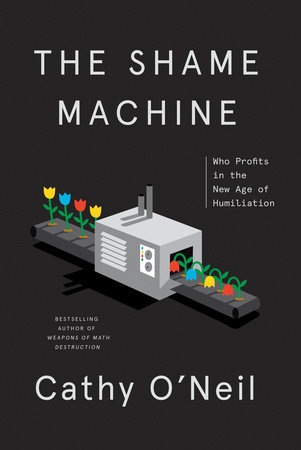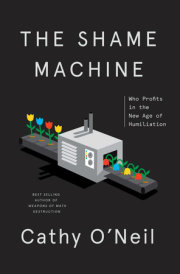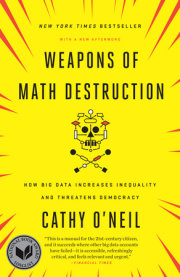Chapter 1
Tipping the Scales
I was jubilant. On a gusty autumn day in Cambridge, Massachusetts, word arrived that I’d passed my “qual,” or qualifying exam. This was a crucial step toward earning my mathematics PhD. With my doctorate halfway in the bag, I was primed to celebrate—by baking a batch of cookies. In the sunniest, most triumphant mood I went to the Get-N-Go, a bodega next door to my Somerville digs, for ingredients.
I knew the clerk there. He’d always been friendly. But when I placed the flour, sugar, and chocolate chips on the counter, he shook his head and said, “Why are you buying that? Don’t you know you’re fat?”
I felt as though he’d slapped me on my double chin. My heart raced; tears leapt to my eyes. I was speechless, but I knew what this was from experience, and from an early age: shame shock.
Much of the suffering from being fat occurs on a gentler and more subtle scale. It’s the looks people give you in hallways and on airplanes, the waiter’s uneasy pause before asking if you want to see the dessert menu. Those microdoses of shame keep low-level misery and self-hatred on a steady course. Shame shock, though, is an explosion. It often occurs when someone confronts you, head-on, about your deepest shame. When you’re exposed.
At that moment in the bodega, all of the shame’s poison coursed through my body, leaving me frozen, disoriented, in pain. In this state, I lost track of who I was. I felt worthless, a flop, unloved.
I gathered the ingredients and made my way out of the bodega without saying a word. Even as the initial shock wore off, I remained under its spell. During the aftershock, it felt as if I were sinking, and I desperately worked to right the ship—propping up my own self-worth. I was getting a PhD, I told myself. I had a boyfriend. I was kind to people.
Such counterarguments ping harmlessly against the edifice of shame and dissolve. Shame transcends mere logic and extends its roots into biology. It stirs up hormones, tightens the jaw, turns the stomach into knots, triggers pain receptors in the brain, and, all the while, pummels self-esteem into mush.
To a lot of readers, this may sound extreme. Many people never experience a powerful shame shock, or don’t remember it too well. For quite a few, no doubt, the concept of shame might resuscitate awful memories from the past—middle school embarrassments, awkwardness in the mating game, a demotion at work. But this week, perhaps this year if they’re lucky, shame may appear to hover safely at bay. Someone else’s problem.
However, as we’ll see in this book, shame is a quietly active force, even among people who cannot recall being recently shame-shocked and claim to feel fine about themselves. After all, shame—both in the giving and in the receiving—does most of its nasty work in the dark, often tiptoeing around the edges of the conscious mind. We tend to forget how bad it feels.
Still, whether it’s a full-blown case of shock, as I experienced in the bodega, or deeply buried feelings of worthlessness and vulnerability, the crucial question becomes urgent: What did I do wrong? There seems to have been a choice, a fork in the road. Every healthy and self-respecting member of society followed the right route, and I took the wrong one. Maybe I was weak, lazy, or stupid. Whatever the reason, I feel ashamed, because I screwed up.
The entire shamescape hinges on this idea of choice, which is usually false. Millions of us carry around the enduring pain of making the wrong choice again and again. We harbor an abiding fear that shame will explode, as it did on me in that Somerville corner store, and that we’ll be unmasked as losers. And we hold out hope that by pursuing the right choice, we can free ourselves of shame.
My own story is a case study in how shame is born, how it’s sustained, nurtured, and monetized. Fat shame conditioned my behavior, step-by-step, year by year. This is the journey that opened my eyes to the insidious dominance of shame in our lives.
It began forty years ago, when I was a pudgy girl living with her two overweight parents in a Boston suburb in the 1980s. Always big for my age, I was already the size of a grown woman by the time I reached fourth grade. At my Lexington public school, I was an outcast, the kid who got picked last for the team, who sat alone in the cafeteria. My size appeared to signal that I was a reject.
I suffered plenty of humiliations in gym class, but the most excruciating was the yearly weigh-in for the Presidential Physical Fitness Test. I remember standing in line in the gym for my turn to be weighed. As each child ahead of me stepped onto the scale, the nurse shouted out the result to the gym teacher, who wrote down the numbers on a pad. My classmates all seemed to weigh about seventy pounds. I was well aware that I weighed more than one hundred. As I stepped onto the scale, I bowed my head in shame—my face hot, my stomach in knots—bracing myself for the nurse to call out the embarrassing number. For days afterward, the other kids taunted me: “Do you really weigh that much? 105 pounds?”
Something had to be done. So at age eleven, I was ready and willing when my parents told me I’d need to go on a diet. They sat me down and explained that calories were units of energy. If we could control them—making sure we ate less than our “maintenance amount”—we’d lose weight. Burn more calories than you consume, you drop pounds, my dad explained. Easy peasy.
The diet promised a pathway from shame. The implicit assumption was that from my earliest years I had screwed up by overeating. Given a choice, I had followed my appetite and selfishly opted for gluttony, one of the seven deadly sins. But I could return to the norm by shackling my hunger. All I had to do was follow the rules. As a budding mathematician, logical rules were my specialty.
My parents were both PhD mathematicians. Science and math were the ruling belief systems in our household. Whether it was the weather outside or human evolution, my parents believed inherently in the objectivity of facts—it was their religion.
Naturally, they followed science, as they saw it, in their meticulous approach to dieting. They kept a towering doctor’s office scale in the bathroom and updated weight charts on graph paper, noting every pound lost, every pound gained. I had watched this process for years. Now I was joining the effort.
My goal was to lose two pounds a week. That translated into cutting my consumption by one thousand calories per day. For a young nerd like me, this was exciting. Not only was I going to lose weight, I could use my math skills in the process. We had a calorie-counting book on a shelf in the kitchen. I looked up the value of everything I ate in it and then added it all up. By subtracting this sum from my “maintenance amount,” I calculated how much more I could eat.
My father explained that if I succeeded in limiting calories I could reward myself at the end of the week with a candy bar of my choice. If I failed, I’d lose my allowance that week. He wielded carrots and sticks to make sure I understood the urgency of the problem.
At first, I loved dieting. Each Saturday, my mom weighed me on our special scale to check on my progress and determine whether I deserved punishment or reward. The scale had two beams, the big one for increments of fifty pounds and the smaller for single pounds. I stepped up, hearing the thud of the scale as it balanced, and watched in anticipation. When I saw that my weight had gone down, the feeling of achievement was intoxicating.
After those first few successes on the scale, I became relentlessly focused on food and my future thin self. I ditched regular meals and instead ate multiple packages of hundred-calorie “fruit snacks,” as those made counting calories even easier, and the tiny, bite-sized amounts helped me to slow down my enjoyment. I felt elated, empowered—and totally in control of my body for the first time in my young life.
This dieting honeymoon didn’t last. A couple of months into the process, something weird began to happen. I’d start the day strong but by the afternoon I struggled to remember what I’d eaten, or how many calories I’d already consumed. By the end of the day, I’d lost count completely, my precious numbers slipping away from me.
Many readers at this point are no doubt thinking that I was just one more failed dieter, and that I clearly lacked self-control. That is the universal tenet of fat shame: Diets work; dieters fail. And believe me, I embraced this credo as fervently as anyone.
As my lost pounds returned, I began to dread the weekly weigh-ins. Each Saturday, I’d wake up before dawn feeling dark and broken. In hindsight, I know this was shame. But in those early mornings lying awake in bed, I only knew that I was miserable.
Copyright © 2022 by Cathy O'Neil. All rights reserved. No part of this excerpt may be reproduced or reprinted without permission in writing from the publisher.











